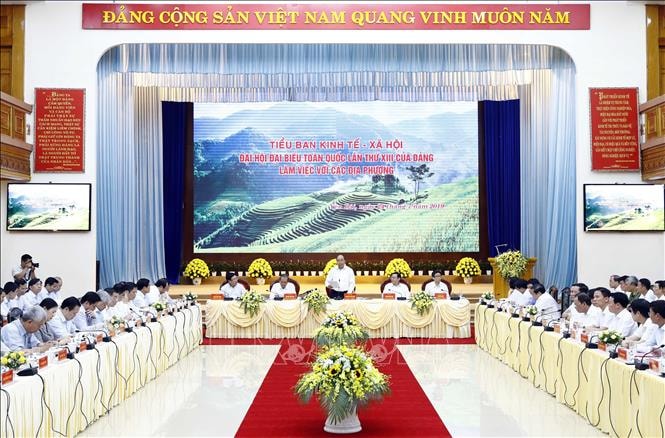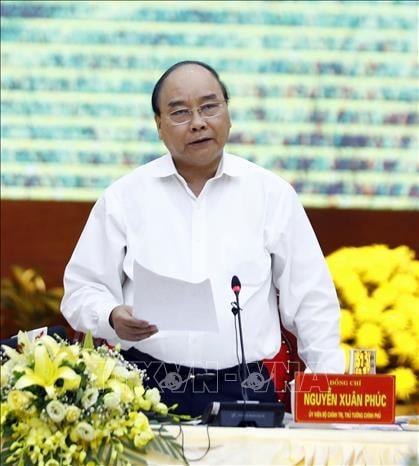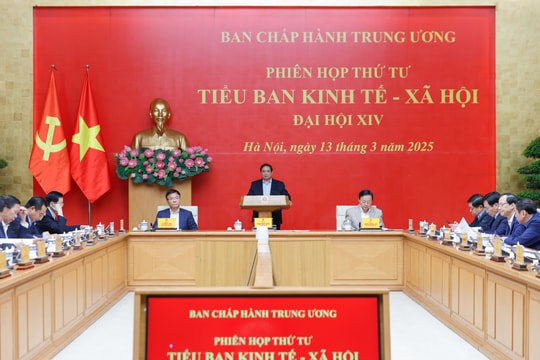The Prime Minister chaired the working session of the 13th Party Congress's Socio-Economic Subcommittee with 12 provinces and cities.
On July 24, in Yen Bai province, Comrade Nguyen Xuan Phuc - Politburo member, Prime Minister chaired a working session of the 13th National Party Congress's Socio-Economic Subcommittee with leaders of the northern mountainous provinces, Thanh Hoa, Nghe An provinces and Hanoi City.
 |
| View of the working session. Photo: Thong Nhat/VNA |
Attending the meeting were Deputy Prime Ministers and leaders of ministries and branches.
This is the 5th working session of the Subcommittee with localities. Leaders of 12 localities attended the meeting including Yen Bai, Cao Bang, Phu Tho, Son La, Hoa Binh, Lao Cai, Dien Bien, Lai Chau, Ha Giang, Nghe An, Hanoi, Thanh Hoa.
Local leaders at the working session said that they have performed well in socio-economic development tasks in recent times, with good economic growth, focusing on removing three bottlenecks: institutions, human resources and infrastructure; people's lives have improved, and the poverty rate in some provinces has decreased sharply.
However, according to local leaders, the Northern midland and mountainous provinces are still facing many difficulties, with a high rate of poor and near-poor households. Even in Lao Cai, a developing province in the region, 1 in 4 households is poor or near-poor. Although infrastructure has been improved, this is still the issue that localities request the most investment in the coming time. Although there are "golden forests", the reality is that people cannot make a living from forestry.
With the advantage of a large forest area in the region, Yen Bai Provincial Party Secretary Pham Thi Thanh Tra said that this is a biosphere, the green lung of the country, so it is necessary to allocate resources to prioritize preserving and promoting the value of this biosphere. Pointing out the characteristics of the northern provinces where many ethnic groups live together, with Yen Bai alone having 57% ethnic minorities, Provincial Party Secretary Pham Thi Thanh Tra said that it is necessary to continue investing to preserve and promote the cultural identity of the ethnic groups living in the area, both maintaining socio-political stability and contributing to tourism development.
Localities also proposed that there should be a separate mechanism for regional development, promoting decentralization and further delegating power to localities, especially in implementing investment projects.
Giving a very remarkable figure that 9-30% of people under 15 years old in the provinces in the region have never been to school, leaders of some localities especially emphasized the need for favorable mechanisms for education and training activities; especially training and fostering high-level human resources and leaders to have new thinking in development.
 |
| Prime Minister Nguyen Xuan Phuc, Head of the Economic and Social Subcommittee of the 13th National Party Congress, delivered the concluding speech. Photo: Thong Nhat/VNA |
Speaking at the meeting, Prime Minister Nguyen Xuan Phuc, Head of the Subcommittee, shared the difficulties and losses of Yen Bai province in the recent floods; at the same time, he praised the province's efforts to quickly overcome the consequences of the floods. The Prime Minister also reminded the northern provinces to always be proactive in preventing floods, including flash floods, to avoid loss of life and property of the people.
The Prime Minister emphasized that the spirit is that the documents preparing for the 13th National Party Congress must be close to life, so the Subcommittee worked with local leaders in regions across the country. This is an important practical basis for building important documents: the 5-year socio-economic development orientation 2021-2025 and the 10-year socio-economic development strategy 2021-2030.
Prime Minister Nguyen Xuan Phuc highly appreciated the local leaders for raising many quality, frank, profound and meaningful opinions in the congress documents; proposing many solutions for regional development. The Prime Minister said that the solidarity, determination and aspiration of the localities are important advantages to promote regional development.
The Prime Minister suggested that, in the context of a socialist-oriented market economy, it is necessary to study and exploit the unique advantages, especially in regions with revolutionary traditions, diverse cultures, and natural and social conditions for development. In addition, this is also a medicinal herb region; located next to a large market.
“The very important advantage is belief, aspiration, solidarity, and very high political determination with the revolutionary tradition of the homeland,” said the Prime Minister.
Assessing the results of the implementation of socio-economic tasks over the past 10 years, the Prime Minister said that it is necessary to continue promoting the achievements of innovation. 11 provinces in the region and Hanoi have had socio-political stability, people's confidence has been consolidated, the economy has developed sustainably and all have grown higher than the set target. Many localities have strongly shifted their structure; many provinces have increased the scale of their economy, and budget revenue has increased. In particular, Yen Bai province set a target of reaching 3,000 billion VND in budget revenue by 2020, and has now reached 3,300 billion VND. Notably, despite difficulties, localities are very interested in social security and poverty reduction. Many provinces have continuously reduced by 4-6%, people's lives have been improved.
The Prime Minister emphasized the very important role of the region in protecting national sovereignty, border security; political stability, people's peace of mind, creating conditions for national development. In particular, the region is the "lungs" of the whole country, playing an important role in protecting the ecological environment, ensuring sustainable development, regulating water for production and daily life for both the Red River Delta and the capital.
From that reality, Prime Minister Nguyen Xuan Phuc oriented the development perspective for the region towards comprehensiveness and sustainability. Along with socio-economic development, maintaining national defense and security, and Party building, socio-economic development is an important task. The Prime Minister stated that first of all, it is necessary to focus on keeping the people, stabilizing and improving people's lives, because the poverty rate of this region is over 17%, the poverty rate of the whole country is about 7%; maintaining national solidarity and implementing ethnic policies well; preserving forests, restoring and planting forests, developing sustainable forestry; preserving land, stabilizing border security, protecting sovereignty, and protecting water resources.
“Taking security and welfare seriously is an issue for the region,” said the Prime Minister.
Emphasizing that the human factor is important for development, the Prime Minister said that education in the nine northern mountainous provinces is still weak and is still a low-lying area, so it needs to be focused on overcoming it.
The Prime Minister also suggested that the provinces in the region need to make the most of each locality's comparative advantages, dynamism, creativity, turn challenges into opportunities, turn weaknesses into development advantages such as unique and diverse cultural identity to develop tourism; high forest coverage rate helps develop sustainable forestry; bordering the large market of China can promote import and export; effectively exploit and use large land funds to develop crops and livestock with strengths.
Regarding the development direction of the region, in addition to sustainable development and green development, an important direction that the Prime Minister noted is to overcome shortcomings in direction and management from the central to local levels, especially development policies to stabilize; expand development space not only with Hanoi but also promote cooperation with markets in the region.
The Prime Minister agreed with localities on the need to develop new specific policies, increase investment in infrastructure, and promote economic development, including through ODA and other socialized resources. The Prime Minister assigned the Ministry of Transport and the Government Office to gather to study and solve the region's infrastructure problems.



